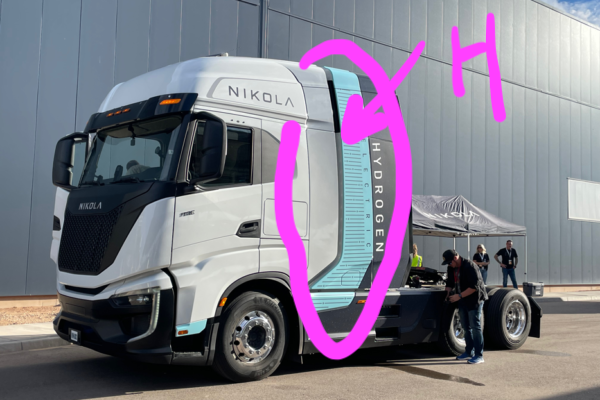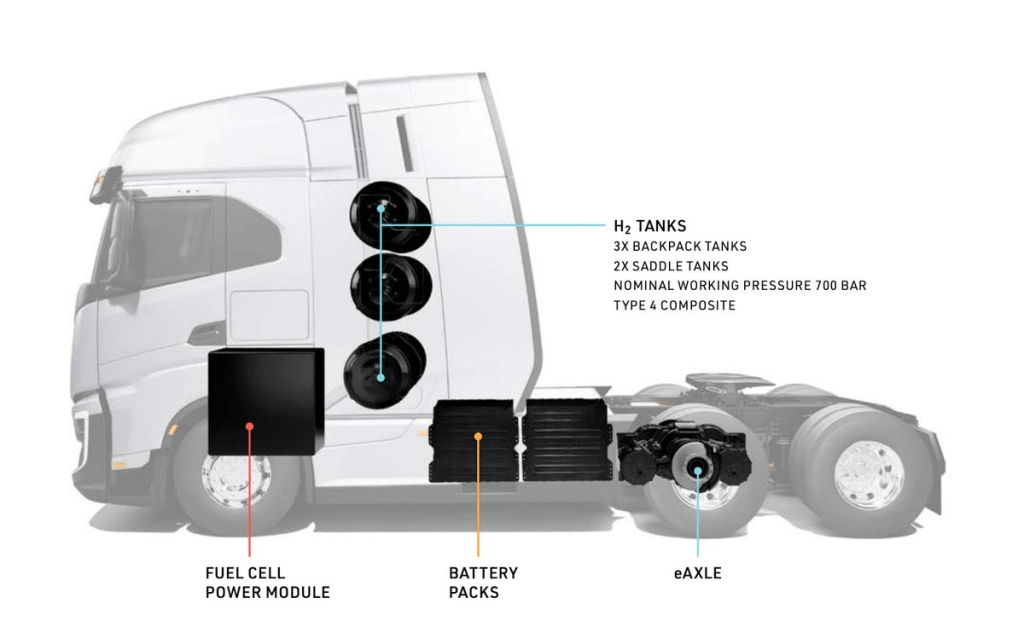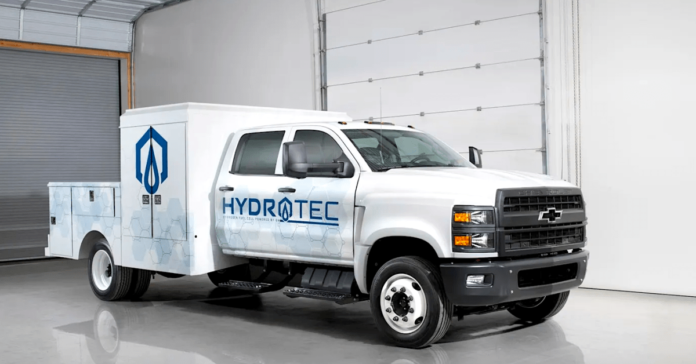This hydrogen-powered GM commercial truck offers 300 miles of range and “generates enough electricity to power 250 typical American homes” (for a few minutes?). Just not at the same time.
GM is calling this latest fuel cell-powered truck concept the foundation of “a hydrogen-based worksite ecosystem,” and imagines a world where Chevrolet Silverado 5500 MD trucks like this one are fitted with HYDROTEC fuel cell systems capable of generating 300 kW of peak power. The trucks would then serve as generators for on-site tools, portable offices, and more.
Jacob Lozier, HYDROTEC’s program manager, told reporters last week that these trucks could, “power job sites or bring charging to EVs in areas where traditional charging is not available,” before adding that, “it has enough power and energy to provide power for up to 250 American homes.”
GM and its partners were able to get more than 300 miles of range from the big MD Chevy (compared to 450 from the Silverado EV), which has a … let’s go with “unique” look, that places the tanks inside a utility body.
The vehicles were built with funding awarded from the Department of Energy’s SuperTruck 3 program and the Hydrogen and Fuel Cell Technologies Office as part of a pilot program to demonstrate the real-world capabilities of fuel cells for fleet and commercial customers.
Southern Company, one of the largest southern utility companies, will receive the HYDROTEC fuel cell-powered Chevy MD trucks and use them as shop vehicles at its worksites. Southern Company, together with GM and Nel ASA, will also test out a hydrogen microgrid for fueling infrastructure that includes a stationary fuel cell-based mobile power generator.
Electrek’s Jo’s Take
Look, I am the first person to say that battery-electric power is not the answer for everything. I’m a “right tool for the right job” kind of person. I understand that certain jobs in certain fields require kilowatt hours of energy every hour. Batteries made with today’s technology would have to be so huge to provide that power that the vehicle they’re attached to would sink into asphalt, let alone dirt and mud. Hydrogen, when blended with diesel to cut carbon and NOx emissions and in a few other extremely limited combustion scenarios, has a (temporary) role.
This ain’t it.
“It’s just awful,” I wrote to Electrek chief Seth Weintraub. “I can’t believe it’s not an April Fools’ joke.”
“Dear lord,” he wrote back. “I guess the mobile power generators is something needed but only 300 miles is laughable … if it can go 300 miles and it’s a generator that puts out 1MW,” he said, re-reading the release, “then, OK. This makes sense.”
I looked at it again and shook my head. “For what it’s worth, I’m almost certain that’s in total. Look at all the hydrogen it takes to get a Nikola to go 400-ish miles.”
Nikola hydrogen semi truck


Still, I didn’t want to call GM’s multimillion dollar hydrogen truck program a laughable monstrosity without some due diligence, so I reached out to GM’s press contact. I sent over the following email in a quest for clarity:
Reading this article, it’s not clear if the truck has 300 miles of range AND “can power 250 homes for a day” or has 300 miles of range OR “can power 250 homes for a day.” Can you help clarify if the range is tied to the output? Meaning: can it drive out 150 (ish) miles, provide that power, then drive 150 (ish) miles back?
My email to gm
Their response was professionally short.
The 250 homes portion is to put it into perspective the amount of power the truck has. Driving the trucks would reduce the available fuel storage for powering homes, etc.
GM press contact
So, what is it exactly that GM and HYDROTEC have shown us here? Because, from where I sit, what we have here is an enormous MD pickup with significantly reduced range when compared to its diesel counterparts, that’s limited to a 7ft. of bed space (which, one imagines, would drop to zero on even a Silverado 3500 dually) that can power a job site for about the same amount for time as a F-150 (as long as it’s not too far away from a hydrogen filling station) and for significantly less time than a conventional EV or solar-powered gen set. And it does all those things worse than existing technologies at a significantly higher cost than any, with a dubious environmental advantage to diesel and none to battery and solar.
When MAN Truck’s CEO Alexander Vlaskamp told reporters that it was “impossible for hydrogen to effectively compete with battery electric trucks,” I believed him. I just didn’t expect GM to prove his point.


